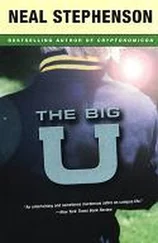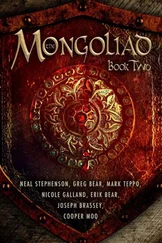Neal Stephenson - The Mongoliad - Book One
Здесь есть возможность читать онлайн «Neal Stephenson - The Mongoliad - Book One» весь текст электронной книги совершенно бесплатно (целиком полную версию без сокращений). В некоторых случаях можно слушать аудио, скачать через торрент в формате fb2 и присутствует краткое содержание. Город: Las Vegas, Год выпуска: 2012, ISBN: 2012, Издательство: 47North, Жанр: Эпическая фантастика, Фэнтези, на английском языке. Описание произведения, (предисловие) а так же отзывы посетителей доступны на портале библиотеки ЛибКат.
- Название:The Mongoliad: Book One
- Автор:
- Издательство:47North
- Жанр:
- Год:2012
- Город:Las Vegas
- ISBN:978-1-61218-236-0
- Рейтинг книги:5 / 5. Голосов: 1
-
Избранное:Добавить в избранное
- Отзывы:
-
Ваша оценка:
- 100
- 1
- 2
- 3
- 4
- 5
The Mongoliad: Book One: краткое содержание, описание и аннотация
Предлагаем к чтению аннотацию, описание, краткое содержание или предисловие (зависит от того, что написал сам автор книги «The Mongoliad: Book One»). Если вы не нашли необходимую информацию о книге — напишите в комментариях, мы постараемся отыскать её.
The Mongoliad: Book One — читать онлайн бесплатно полную книгу (весь текст) целиком
Ниже представлен текст книги, разбитый по страницам. Система сохранения места последней прочитанной страницы, позволяет с удобством читать онлайн бесплатно книгу «The Mongoliad: Book One», без необходимости каждый раз заново искать на чём Вы остановились. Поставьте закладку, и сможете в любой момент перейти на страницу, на которой закончили чтение.
Интервал:
Закладка:

TO MICHAEL “TINKER” PEARCE,
ANGUS TRIM & GUY WINDSOR

THEY PUT SWORDS INOUR HANDS
AND TAUGHTUS HOW TO USE THEM.

CHAPTER 1:
NEW GROWTH AMONGST OLD STONES

Cnán halted just outside the clearing surrounding the stone monastery and dropped to a crouch. She knew how to move silently in the dense woods of the North, and she had approached the isolated ruins more quietly than the breeze in the branches or the insects scuttling under last year’s leaves.
Through the uneven morning mist, she could make out the ruin of the monastery on the northern verge. The broken, roofless walls of outbuildings stretched south of the main ruins in a broken curve. Birches and a few young oaks had grown up where monks had likely once raised vegetables. The rest of the clearing was filled with grass and brambles cut through with newly blazed paths. Four lean-tos had been erected just beyond the stone fence of an overgrown graveyard.
She had found a camp—that much was certain. But whose camp?
From far away came the rattle of a woodpecker gathering breakfast, interrupted by a closer and louder clash of steel—the unnatural sound that had drawn her attention. This close, she could hear men talking—many men—but she had yet to see the monastery’s new guests.
Two days before, a band of black bone Mongols had chased her like a deer to the edge of the thick forest, where they had jerked up short, cursing in bastard Turkic and peppering the trees with arrows. Steppe-bred warriors loathed thrashing through cluttered groves where they could neither gallop freely nor swivel quickly on their powerful ponies. The deep woods were still safe, though traveling through them was slow.
It was just after the solstice: three months since the dissolute Khan known as Onghwe had defeated the armies of Christendom at Legnica, just a few miles from here, and a bit more than one month since he had issued his challenge.
She shifted to her left, darting behind the trunk of an elder oak. She stroked the bark lightly as if to ask the oak for guidance, then passed her fingers over her eyes in an old Binder prayer. The mist was clearing already; she could wait. In these lands, a well-trained adept knew to be patient.
Snatches of a conversation came to her, a back-and-forth argument that sounded like it hadn’t started this morning, nor would it be finished anytime soon. Cnán recognized the cadences of Latin, which she had not heard in a while and had not spoken since childhood.
“—relax your vision. You know where the blade is. Stop looking at it—”
“—don’t close your eyes! You might as well throw down your sword altogether. Are you a dumb lamb?”
“—if you watch his blade, it is too late. You can’t see his eyes, so why are you—”
Less than a stone’s throw away, a young man, no more than twenty years of age and crowned with hair so blond it was almost white, was facing an older man—a bulky, battle-scarred redhead. Both were carrying great swords of war, and their repetitive exercises were being observed by a man dressed like a monk.
These men were likely knights of the Shield-Brethren—the ones she had been instructed to find. If there were anything to their reputation, they would have responded within days to the Khan’s unlikely invitation. The Shield-Brethren were scattered all about, but their closest branch was in Petraathen, an ancient crag-fort in the mountains south of Kraków, just a few days’ journey from here. Their instinct—the reverse of the Mongols—was to camp in the woods, and their scouts had spied this old monastery, long since abandoned. To her, it had the look of a pagan temple, reminding her of the subterranean mithraeum , the hidden temple wherein her people had once held their arcane rites. This ruin, whatever its original purpose, had been converted into an impromptu chapter house, a sanctuary where these knights could wait and train while they reconnoitered the territory around the blood-soaked battlefield of Legnica and the great, stinking tent city that Onghwe had built there.
A horseman emerged from behind the graveyard wall riding a big blue roan stallion. Cnán flinched at the sight of a Mongol-style bow, striped and jointed like the leg of an insect, held out in the man’s hands. But this was no Mongol: his hair was brown, long and full, and below his sharp nose drooped a luxuriant mustache. He pivoted his mount and galloped along the curve of outbuildings, then pivoted again and rode back and forth through the grass. His apparently aimless movements made no sense until she understood that he was practicing archery. When his eye fell on something that looked like it might serve as a target, he loosed an arrow from the bow, sometimes galloping past, sometimes away, or jerking his horse up short and shooting from a standstill.
She did not know these knights other than by reputation, but she saw the rider as one who had suffered under the power of the Mongols and had learned from them, adopting and adapting their weapons.
Farther back in the clearing, visible through dispersing curtains of fog and over the tumbled walls of a refectory, a young man was striking at an upright log with a sword, repeating the same attack over and over again. Near him, two others sparred with carved wooden sticks while another paced around them, sidestepping as necessary. To her left, in the green shade of a sapling oak, two men sat at a table assembled from half-rotted lumber, sharing refreshment from battered brass cups. Both wore trim dark hair. One sported a dark beard and had black eyes to match— a kind of Saracen , she thought—his Syrian heritage apparent also in the cut of his clothes.
The other, rounder of face and lively, flashed pale eyes as his nervous fingers fidgeted, and he whispered in short bursts as if laying out plans he knew the dark-eyed one would not approve.
Nine that she could see, then. A strong crew, but mostly young—and not the sorts of men usually found in close company. This was either good and expected or very bad indeed—for in the Land of Skulls, this region that had been devastated by the passage of the Mongol hordes, desperation and evil intent often united the most diverse stragglers.
Still, they seemed to be the ones she had been sent to find.
Ordo Militum Vindicis Intactae now claimed to be Christian, so hiding near a monastery would come naturally to them. There were stories, however, of how, in older days, the knights of Petraathen had practiced a cult of death, harboring strange ideas about the benefits accruing in the afterlife to warriors who went down bloody and swinging. These brethren then might also take comfort from sharing quarters with the heroic and blessed warrior dead. From where she squatted, she counted seven big granite Crusader crosses in the monastery’s overgrown graveyard, erected perhaps a century and a half before.
Cnán picked at her teeth with a twig, then shifted on her knees, practicing quiet breath, quiet heart—confident in her stealth, contented to watch unobserved.
Or so she told herself until she heard a flicking noise behind her head. A twang, a hiss, and something jerked her off her feet, slamming her head against a tree with a thunk that rang her skull like a bell.
Читать дальшеИнтервал:
Закладка:
Похожие книги на «The Mongoliad: Book One»
Представляем Вашему вниманию похожие книги на «The Mongoliad: Book One» списком для выбора. Мы отобрали схожую по названию и смыслу литературу в надежде предоставить читателям больше вариантов отыскать новые, интересные, ещё непрочитанные произведения.
Обсуждение, отзывы о книге «The Mongoliad: Book One» и просто собственные мнения читателей. Оставьте ваши комментарии, напишите, что Вы думаете о произведении, его смысле или главных героях. Укажите что конкретно понравилось, а что нет, и почему Вы так считаете.







